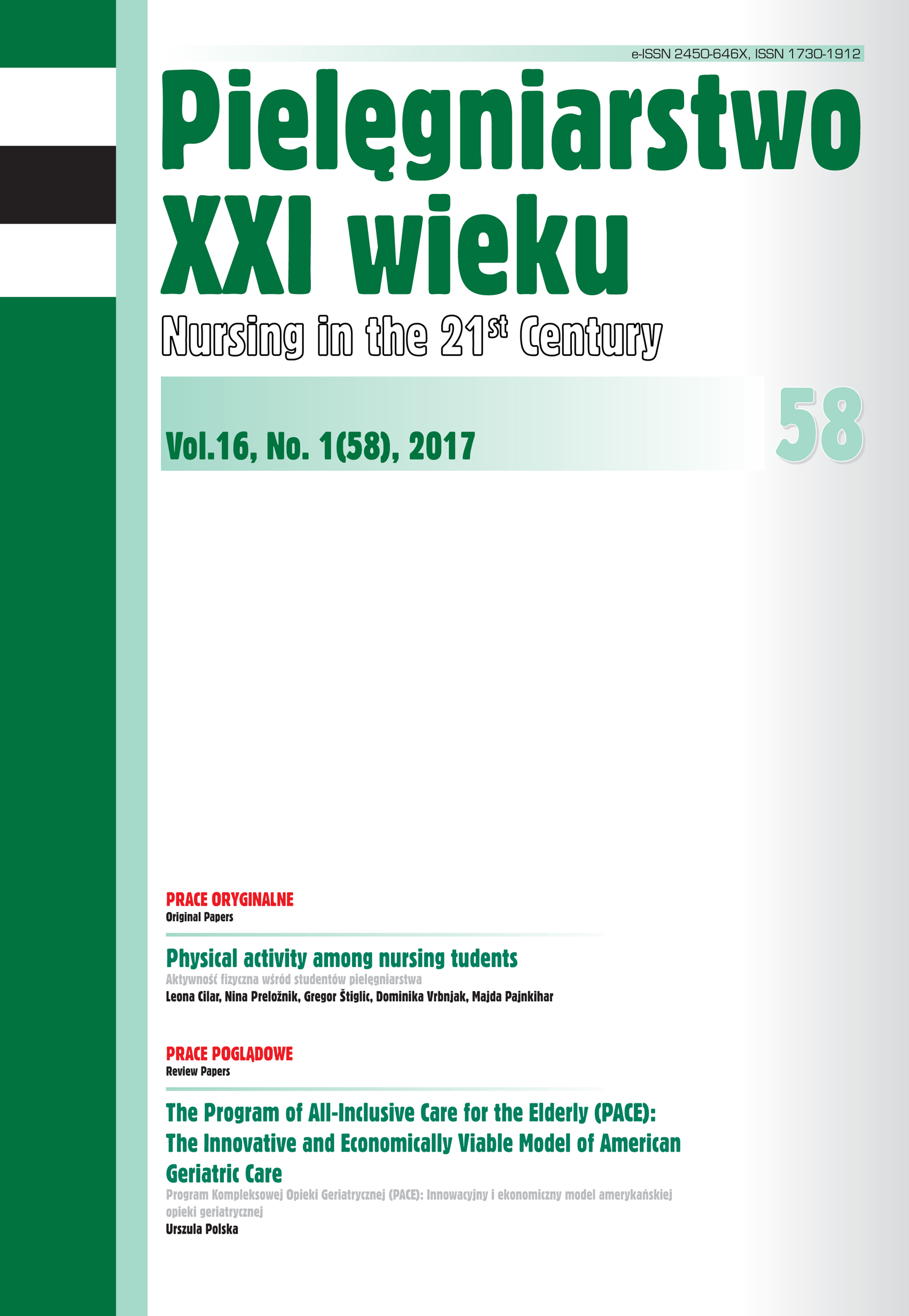The level of emotional intelligence in undergraduate students of nursing
DOI:
https://doi.org/10.1515/pielxxiw-2017-0004Keywords:
emotional intelligence, nursing students, nursing educationAbstract
THE LEVEL OF EMOTIONAL INTELLIGENCE IN UNDERGRADUATE STUDENTS OF NURSING
Aim. The theory of emotional intelligence provides a framework to think about all of the non-technical skills you need in order to be a good nurse. It’s often described as the potential to feel, use, communicate, recognize, remember, describe, identify, learn from, manage, understand, and explain emotions. The aim of the study was to determine the level of total global Emotional Intelligence among undergraduate students of nursing and also to check the influence of factors (the year of study, type of completed high school education) on Emotional Intelligence.
Methods. The study involved together 86 university students of nursing (average age 21.7±1.4; 96.5% females). We used the standardized questionnaire Trait Emotional Intelligence Questionnaire – Short Form (TEIQue-SF).
Results. The results show a higher level scores achieved by nursing students in all areas EI except Self-control compared to a population norm. Students who have completed non-health’s education achieved higher level scores of Emotionality (p ≤ 0.05).
Conclusions. EI abilities are essential for the profession of nursing in both educational and clinical practice. Examination of the role of education and the development of EI abilities in student nurses are needed to support this foundation of EI research.
References
1. Mayer JD, Salovey P, Caruso DR. A further consideration of the issues of emotional intelligence. Psychol. Inq. 2004; 15: 249-255.
2. Petrides KV, Furnham A. Trait emotional intelligence: Behavioral validations in two studies of emotion, recognition and reactivity to mood induction. European Journal of Personality. 2013; 57(17): 3957. http://doi.org/10.1002/per.466.
3. Schutte NS, Malouff JM, Bobik C, et al. Emotional intelligence and interpersonal relations. J. Soc. Psychol. 2001; 141: 523-536.
4. Bulmer Smith K, Profetto-McGrath J, Cummings GG. Emotional intelligence and nursing: An integrative literature review. Int. J. Nurs. Stud. 2009; 46: 1624-1636.
5. Taylor R, Macduff C, Stephen A A national study of selection processes for student nurses and midwives. Nurse Educ. Today. 2014;34:1155–1160. DOI: http://dx.doi.org/10.1016/j.nedt.2014.04.024.
6. Austin E, Saklofske D, Huang S, Mckenney D. Measurement of trait emotional intelligence: testing and cross-validating a modified version of Schutte et al’s. (1998) measure. Personal. Individ. Differ. 2004;36:555–562. DOI: http://dx.doi.org/10.1016/S0191-8869(03)00114-4.
7. Qualter P, Ireland J, Gardner K. Exploratory and confirmatory factor analysis of the Schutte Self-Report Emotional Intelligence Scale (SSREI) in a sample of male offenders. Br. J. Forensic Pract. 2010; 12: 43–52.
8. Salovey P, Mayer JD. Emotional intelligence. Imagin. Cogn. Pers. 1990; 9: 185-211.
9. Petrides KV, Furnham A. The role of trait emotional intelligence in a gender-specific model of organizational variables. Journal of Applied Social Psychology. 2006; 36(2): 552-569. http://doi.org/10.1111/j.0021-9029.2006.00019.x
10. Petrides KV, Mikolajczak M, Mavroveli S, et al. Developments in trait emotional intelligence research. Emotion Review. 2016; 8(4): 335-341.
11. Szeles HM. Developing emotional intelligence in student nurse leaders: a mixed methodology study. Asia Pac J Oncol Nurs. 2015;2(2):89-98. doi: 10.4103/2347-5625.157575.
12. Petrides KV, Furnham A. The role of trait emotional intelligence in a gender-specific model of organizational variables. Journal of Applied Social Psychology. 2006; 36: 552-569.
13. Cooper A, Petrides KV. A psychometric analysis of the Trait Emotional Intelligence Questionnaire-Short Form (TEIQue-SF) using Item Response Theory. Journal of Personality Assessment. 2010; 92: 449-457.
14. Kaliská LE, Nábělková Psychometrické vlastnosti a slovenské normy Dotazníkov črtovej emocionálnej inteligencie pre deti, adolescentov a dospelých. Banská Bystrica: Belianum; 2015.
15. Adeyemo DA. Emotional intelligence and the relationship between job satisfaction and organizational commitment of employee in public parastatals in Oyo S tate, Nigeria. Pakistan Journal of Social Sciences. 2007; 4: 324-330.
16. Choi Y, Song E, Oh E. Effects of teaching communication skills using a video clip on a smart phone on communication competence and emotional intelligence in nursing students. Archives of Psychiatric Nursing. 2015; 29: 90-95.
17. Oi Sun L, Mee Ock G. Development and effects of emotional intelligence program for undergraduate nursing students: Mixed methods research. Journal of Korean Academy of Nursing. 2014;44: 682-696.
18. Hegge M, Larson V. Stressors and coping strategies of students in accelerated baccalaureate nursing programs. Nurse Educator. 2008; 33: 26-30.
19. Codier E, Kamikawa C, Kooker BM. The impact of emotional intelligence development on nurse managers. Nurs Adm Q. 2011;35:270-276.
20. Nelis D, Quoidbach J, Mikolajczak M, Hansenne M. Increasing emotional intelligence: (How) is it possible? Pers Individ Dif. 2009;47:36-41.
Published
Issue
Section
License
Copyright (c) 2017 Authors

This work is licensed under a Creative Commons Attribution-NonCommercial-NoDerivatives 3.0 Unported License.




